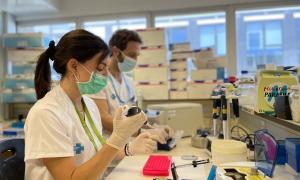Predicting the progression of SARS-CoV-2 and HIV infection by studying the microbiome

After two years marked by the COVID-19 pandemic, The Barcelona Debates on the Human Microbiome is back on site. The conference, the most important in the field of the microbiome at national level, will be held at CosmoCaixa on Thursday 30 June and Friday 1 July, and will be attended by 21 international experts
Knowing from the outset whether an infection is likely to evolve into a disease with severe symptoms has always been an important objective for the medical community, since predicting this risk would improve the health care of affected individuals. Moreover, in a pandemic context such as COVID-19, this aim has become a priority. In this sense, several studies support the usefulness of the composition of the microbiome as a potential prognostic tool for the evolution of infectious diseases, such as COVID-19 and HIV/AIDS. This, among others, will be one of the topics to be discussed at The Barcelona Debates on the Human Microbiome 2022, which will take place on 30 June and 1 July at CosmoCaixa. The debate is organised by the IrsiCaixa AIDS Research Institute –a centre jointly promoted by the "la Caixa" Foundation and the Department of Health of the Generalitat de Catalunya– and counts with "la Caixa" Foundation as main sponsor, as well as with the logistical support of FLS Science.
The congress, which this year celebrates its eighth edition, is coordinated by the director of IrsiCaixa Bonaventura Clotet, the emeritus doctor of the Digestive System Research Unit of the Vall d'Hebron Hospital Research Institute Francisco Guarner and the principal investigator at IrsiCaixa and head of the Infectious Diseases Service of the Germans Trias i Pujol Hospital Roger Paredes. "Being able to bring together experts from all over the world in the field of the microbiome is an excellent opportunity to share the latest knowledge in this area", celebrates Guarner.
The symptomatology of a disease may depend on the microbes that live in your body
Far from being aseptic spaces, our organs are home to thousands of microbes that collectively are known as the microbiome. "For years we have been studying the microbiome and how its composition influences human health. There are infinite patterns in terms of the type of microbes that make up our microbiome, and each of these patterns has a particular impact on how our defences respond to an infectious agent, such as HIV or SARS-CoV-2", explains Paredes.
In fact, the team led by Paredes at IrsiCaixa has recently published a study showing that a greater presence of Bacteroidales and lesser presence of Clostridiales –two types of bacteria commonly found in the human intestinal microbiome–, as well as a lower richness in the variability of microbes that also make up this microbiome, is related to a profile of a person with HIV able to better control the viral load in the absence of treatment. This finding highlights the potential of the gut microbiome as a predictive tool in the control of HIV infection, that is, as a marker to predict which individuals have the necessary conditions to activate the immune system and keep the virus under control.
Severe COVID-19, hand in hand with a highly imbalanced lung microbiome
One of the topics to be discussed at the congress is indeed how the microbiome, in this case the pulmonary microbiome, can influence the course of COVID-19. It will be discussed in the session dedicated to this disease. The other sessions will focus on cancer and metabolic diseases, among others. "Based on a study involving nearly 100 people hospitalised for this and other severe diseases, we have been able to show that there is a real difference between the lung microbiome of people hospitalised for COVID-19 and those hospitalised for other illnesses", explains Frederic Bushman, speaker at the event and Professor of Microbiology at the University of Pennsylvania. "We found that, in people with severe COVID-19, their lung microbiome, particularly in the upper part of the pharynx behind the mouth called the oropharynx, is more imbalanced and associated with a state of systemic inflammation. In fact, a molecule characteristic of this inflammation could be the one that enhances the function of the receptor that allows SARS-CoV-2 to enter cells, facilitating the spread of the virus throughout the body", he adds.
Furthermore, using Artificial Intelligence techniques, Bushman's study demonstrates that microbiome samples obtained from the oropharynx at the earliest stages of SARS-CoV-2 infection have great potential for predicting the severity of COVID-19.
"The achievements made so far in the field of the microbiome confirm once again the importance of promoting research in this area. Having a tool that allows us to know from the outset how an infection will evolve will allow us to make more accurate diagnoses and improve patients' medical care", concludes Clotet.